…while a number of crop inputs have increased in price
In a few weeks, the processing tomato harvest will begin in the province of Seville, one of the regions of Lower Guadalquivir where tomato crops are frequent, particularly in the municipalities of Lebrija, Las Cabezas de San Juan and Utrera, whose growers planted 6000 hectares this year.
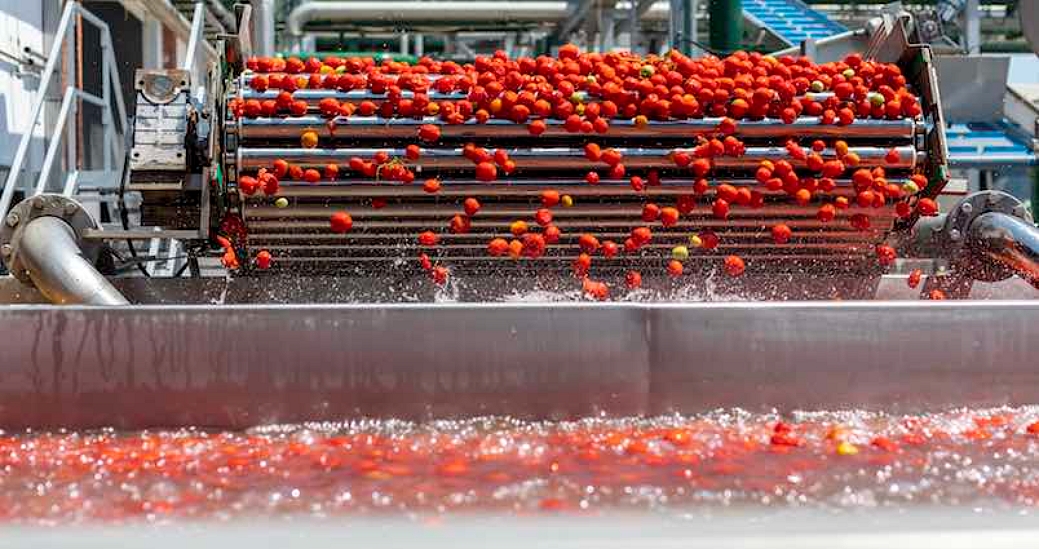 The 2021 harvest is expected to start between 5 and 12 July. Results will be highly dependent on water availability. Most growers adjusted crop planning to the availability of water resources. In many cases, like what happened in California, planting surfaces have been reduced, but, despite these measures, there still remains “a lot of uncertainty about whether there will be enough water to take the crops full term in optimal conditions,” pointed out Carmen Galán, who is technical agricultural director for the Cooperativa Las Marismas de Lebrija. She has underlined that “lack of irrigation has already caused episodes of insufficient growth, with a number of growers worried about water shortages and hesitant to irrigate as much as they should, which has caused great stress for the plants.” She further explained that “a lot of other growers have sacrificed different crops this summer in order to keep all their water reserves for tomatoes.”
The 2021 harvest is expected to start between 5 and 12 July. Results will be highly dependent on water availability. Most growers adjusted crop planning to the availability of water resources. In many cases, like what happened in California, planting surfaces have been reduced, but, despite these measures, there still remains “a lot of uncertainty about whether there will be enough water to take the crops full term in optimal conditions,” pointed out Carmen Galán, who is technical agricultural director for the Cooperativa Las Marismas de Lebrija. She has underlined that “lack of irrigation has already caused episodes of insufficient growth, with a number of growers worried about water shortages and hesitant to irrigate as much as they should, which has caused great stress for the plants.” She further explained that “a lot of other growers have sacrificed different crops this summer in order to keep all their water reserves for tomatoes.”
The Las Marismas cooperative is one of the companies that could see their production drop the season. In any case, the company, which contracted 2200 to 2300 hectares three or four years ago, has reduced its planted surfaces this year to approximately 1800 hectares, and it knows that this decrease will inevitably lead to a drop in processed volumes. Agricultural yields could also suffer from the negative effects of a higher concentration in salts, linked to the reduced availability of water, further explained the agricultural technical director of Las Marismas.
It is not the first time that concerns over the availability of water have impacted a tomato season. “In recent years, we have saved the harvest thanks to spring rains, but this year, circumstances have been very particular, as there have been no rains during springtime. Furthermore, the allocations we received amounted to 3000 m³ per hectare, whereas the needs of the crop vary between 6000 and 8000 m³ per hectare,” stated Carmen Galán.
Crop results will also be affected by the usual plant health issues, of varying gravity, that often hit the crops at the end of the season, like Heliothis, Tuta absoluta and mildew. But “the coming crop will also depend a lot on how the situation evolves in the coming weeks,” insisted the Las Marismas director.
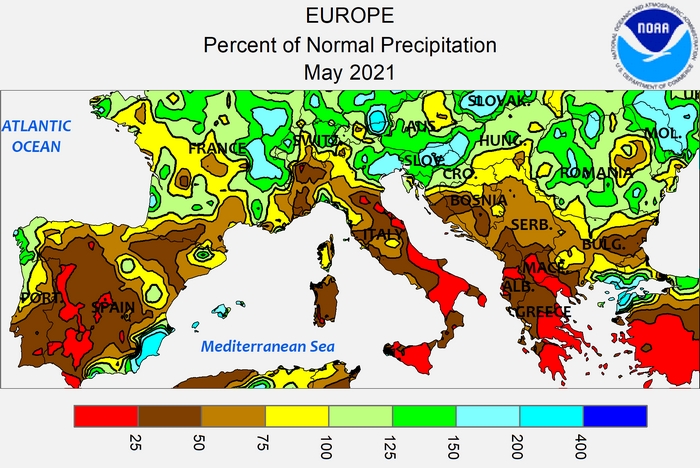
In the zone of influence of the Lebrija cooperative, the tomato harvest lasts approximately two months. “We have an industrial processing capacity of 4500 tonnes per day, as our aim is to end the season as early as possible and thereby avoid September rains. It is still too early to forecast volumes, but we already know that it will be a difficult season, given that we need to face big increases in production costs, like for power supplies.”
Las Marismas is one of the three big companies dedicated to tomato paste production based in the province, along with the Conesa group (based in Extremadura, where it runs two plants) and Tomates del Sur, which is part of the Portuguese group Sugal.
Concerns over the impact that a possible water shortage could have on the final phases of the crop and on the season’s results have also been expressed by Salvador Flores, who is the agricultural director of Tomates del Sur (Sugal Spain).
The Sugal group is one of the world’s biggest tomato paste manufacturers, and in 2010 it acquired the Las Cabezas de San Juan processing plant near Seville, with the aim of making Andalucía “a force to be reckoned with in the field of growing processing tomatoes”, thereby competing with Extremadura, which is currently one of the industry’s leading regions.
Sugal has set up its own production network in the area of Seville, to which the operator adds crops grown by other farmers. In this way, the company absorbs the raw materials grown on 1850 hectares throughout the province, with planting operations that last from early March to mid May. The idea is to “start the tomato harvest as early as possible, on 5 July, and finish on 25 September,” explained Salvador Flores.
In terms of surface areas planted with tomatoes, Tomates del Sur has not reduced its operations. Flores explains that "the surface reductions implemented by local growers because of water restrictions have been compensated by the company itself, which has increased its own production by renting fields, particularly in the province of Cadix. In this way, it has increased its planted surfaces throughout Andalucía, with approximately 2650 hectares this year, against the 2300 planted previous years.”
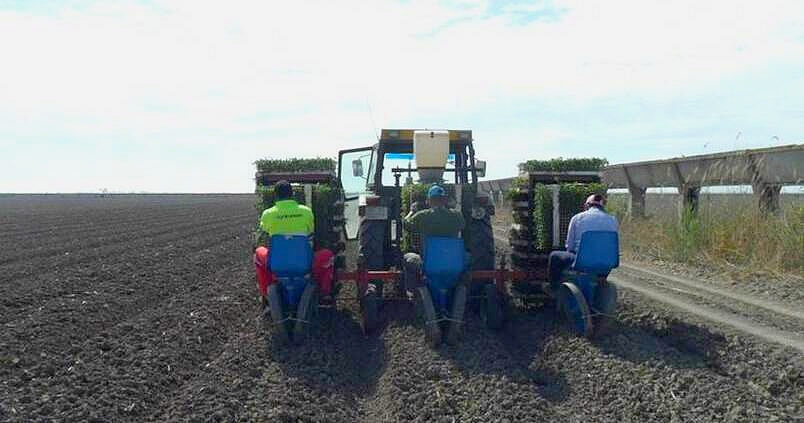
The planting of industrial crops of tomatoes is generally staggered over the months of March and April, and into the first week of May. This makes it possible to plan a harvest that can be carried out progressively over time, with tomatoes being delivered to processing plants over a period of approximately 75 days.
Crops have been developing “in good conditions”, because, other than drought, “there have been no adverse weather episodes, apart from some limited localized damage due to rains carried in by storm Lola on 25 April.” Consequently, “our greatest fear is that growers in the Guadalquivir region may not have enough water to irrigate their crops in the final weeks,” pointed out the agricultural director.
In terms of market outlets for tomato paste, Flores has stated his optimism. He believes that the Covid 19 pandemic “has increased consumption, with stocks decreasing in recent years throughout the world, placing the market in a favorable context, with factories aiming to process a lot of tomatoes.” This is why the Portugal-based group is aiming at the harvest season lasting at least 80 days.
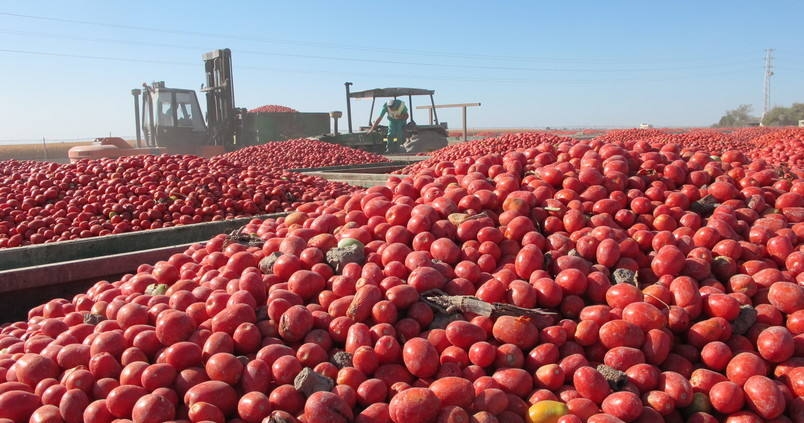
The Conesa group, based in Extremadura, is the country’s biggest tomato processing operator. It will also see regional production reduced this season, mainly due to a drop in planted surfaces that was decided in order to adapt to restrictions in water availability.
For the group’s leaders, there is nothing new about this episode: “Water allocation was less than expected and the farmers need to adapt their farming plan to the water resources they have. So if they have drawn up a good plan for planting the fields with crops they can irrigate, they should not have any problem.”
So whereas Conesa contracts have covered some 4000 hectares in the province of Seville since 2018, “we have reduced planted surfaces for the 2021 season due to lack of water for irrigation, and we planted 2650 hectares,” declared Manuel Diana, Conesa manager for Andalucía.
The Extremaduran group runs two processing plants in the province of Seville (Transformados Agrícolas del Bajo Guadalquivir (Travir), in the city of El Trobal, and Algosur-Pinzón (Alpinsur), in the town of Pinzón (Utrera municipality)), which were bought off the AlgoSur group in 2017. Industrial capacity is “approximately 7500 tonnes per day of processing.”
Currently (as of 24 June), growing conditions have been satisfactory, with the slight possibility of seeing yield prospects in the fields that could be higher than the averages of recent years. Concerns remain that despite efforts to plan irrigation, if a long period of high temperatures should occur, “some growers may lack water due to issues in a number of irrigation communities, and may not be able to carry crops through to the harvest,” explained Diana. Similarly, a number of growers planted more than they could irrigate with the water allocations they received. In the end, this could transform “a potentially very interesting year economically for processing tomato growers into a real catastrophe,” stated the executive.
The group hopes to start the harvest on 12 July and carry it through until 12 September.
Some complementary data
Evolution of processed quantities in Spain since 1989
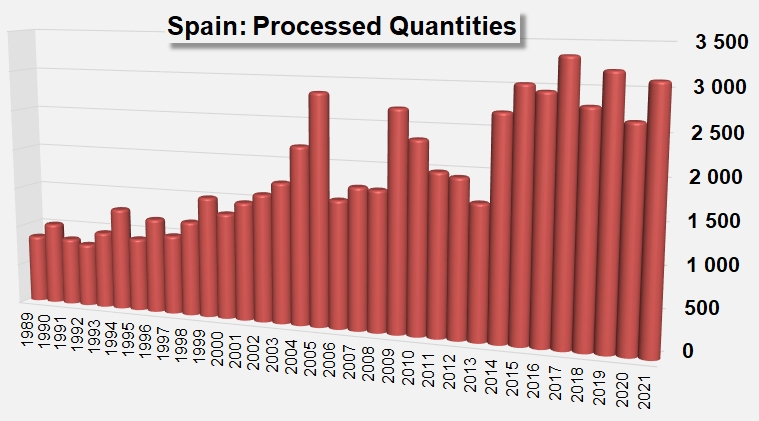
Source: sevilla.abc.es, professional sources


 The 2021 harvest is expected to start between 5 and 12 July. Results will be highly dependent on water availability. Most growers adjusted crop planning to the availability of water resources. In many cases, like what happened in California, planting surfaces have been reduced, but, despite these measures, there still remains “a lot of uncertainty about whether there will be enough water to take the crops full term in optimal conditions,” pointed out Carmen Galán, who is technical agricultural director for the Cooperativa Las Marismas de Lebrija. She has underlined that “lack of irrigation has already caused episodes of insufficient growth, with a number of growers worried about water shortages and hesitant to irrigate as much as they should, which has caused great stress for the plants.” She further explained that “a lot of other growers have sacrificed different crops this summer in order to keep all their water reserves for tomatoes.”
The 2021 harvest is expected to start between 5 and 12 July. Results will be highly dependent on water availability. Most growers adjusted crop planning to the availability of water resources. In many cases, like what happened in California, planting surfaces have been reduced, but, despite these measures, there still remains “a lot of uncertainty about whether there will be enough water to take the crops full term in optimal conditions,” pointed out Carmen Galán, who is technical agricultural director for the Cooperativa Las Marismas de Lebrija. She has underlined that “lack of irrigation has already caused episodes of insufficient growth, with a number of growers worried about water shortages and hesitant to irrigate as much as they should, which has caused great stress for the plants.” She further explained that “a lot of other growers have sacrificed different crops this summer in order to keep all their water reserves for tomatoes.”































